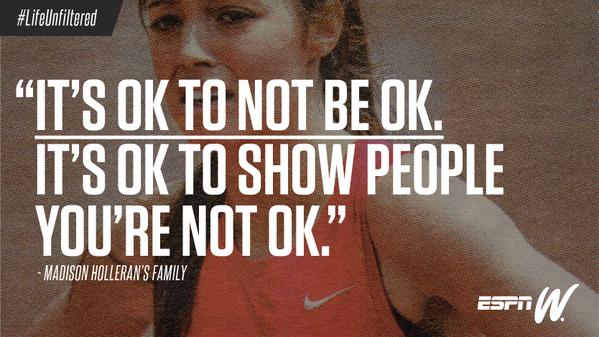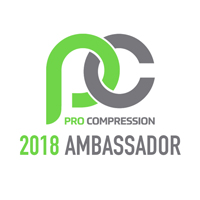Last week I read an article titled Split Image on ESPNW (there is also a 10 min. video called Life, Instagrammed that is worth a watch). I cannot do the story/life justice and I encourage you to experience either or both. I originally read the story online and later watched the video. Both struck a familiar chord that many people have written about before on how Instagram (and most social media in general) portray a filtered view, both literally and metaphorically, but this one has a sad, and tragic ending.
We all know that social media often shares a partial truth. For every Instagram photo posted there are likely 3-4 others that don’t make it up for some reason or another. A photo shared of a family smiling might not show that same family 10 minutes before arguing over any number of things, trivial or major. When I post photos of my shoes next to the First Lady, you probably don’t know that often times we’re having a conversation about putting on her shoes in the first place, but what is shared is a picture-perfect moment of daddy and his little girl’s tiny shoes.
The article on ESPNW takes a look at the life of Madison Holleran, a 19-year old college student who was struggling with her mental health. The article initially grabbed my attention because she was a track athlete, but it stuck with me through most of the weekend because it brings up the point that her life, shared through social media, showed no indication of her struggle.
Again, I’m trying to do my best to capture HER story in a few sentences and highly encourage you to visit ESPNW and read the article or watch the video.
The article and video continue to tell a story of an edited life that was shared through social media with others around her not realizing what was happening OFF-line. Her family was aware of some of the struggles going on in Madison’s life — her unhappiness, her struggles with track, school — and were helping her in any way that they could. But they would never have guessed that their 19-year old daughter would take her own life. No one did.
I am not a mental health expert. I am not a doctor. I’m just a guy with a blog that read this story and it has been on my mind ever since. I understand how social media can do many things: it can show a FRACTION of the truth and at the same time show the strength and love that people can share. A look at the hashtag #lifeunfiltered on Twitter, or #lifeunfiltered on Instagram, can show you how powerful social media can be and how communities can come together.
As a father of a little girl who holds my heart with all her cuteness and at the same time can frustrate me more than I ever thought was possible, I understand sharing a filtered life on social media.
In the words of Madison Holleran’s family:
“IT’S OK TO NOT BE OK. IT’S OK TO SHOW PEOPLE YOU’RE NOT OK.”
If you are struggling, please talk to someone. Anyone. A friend, a family member, a teacher, a doctor. Someone. There are people in this world that can relate to your feelings and emotions. There are people in this world that care — even if they are a stranger. There are people who will listen, be a shoulder for you to lean on, be whatever it is that YOU need them to be.
* * * * * *
National Suicide Prevention Hotline
Are you in crisis? Please take the first step in getting help by calling 1-800-273-TALK (8255). The call is free, and you will be connected to a skilled, trained counselor at a crisis center in your area.
CrisisSupport.org
* * * * * *
The Madison Holleran Foundation
The primary mission of the Madison Holleran Foundation is to prevent suicides and to assist those in a crisis situation with phone numbers and resources that will assist them during their time in crisis. We will also focus our efforts on preparing high school seniors and college freshmen, since this can be a very difficult transition period, as it was for Madison and many college freshmen.
MadisonHolleranFoundation.org
It’s OK to not be OK.











Her story breaks my heart – especially working with college students every day, sometimes it’s the ones that appear “most” okay are really the ones furthest from okay. We need to establish a culture where it’s okay to show the imperfections – that our kids are messy eaters, that not every run went to plan, and that sometimes, it’s okay to fall apart.
Thanks for sharing your thoughts, too. I had a post in the works in response… maybe I’ll get to finishing it now.
I wrote about this on my blog last friday too, almost immediately after reading it. It hit me hard, especially as I was living in philly when she did that. I am glad you wrote about it, and I think it is important we reach out and get the word out. Thank yo for sharing.
Thanks for sharing. I read her story too and naturally it struck a chord. It’s no secret that I personally have struggled with both depression and a variety of eating disorder afflictions, going from anorexic to bulimic. However, that is exactly WHY I feel the need to be open and honest about my issues, how and when I got help, and the like. If sharing and being open makes one person feel less alone, one person feel like they can reach out without judgement, then it’s absolutely worth it to expose my vulnerabilities and scars. There have been a few instances where I reached out to people who were struggling to tell them about my own struggles, and it was definitely rewarding to know I helped bring them some reassurance and strength. Sometimes all it takes is one voice to help us find our own.
Her story is such a tragic one but one that I know many struggle with. I cannot imagine growing up in the age of social media with all of its pressures. My heart aches for her family
I’ve been thinking about this story for most of the weekend too. My heart hurts so much for her family and friends. It’s such a powerful story and reminder that not everything is perfect, especially not everything that we see on social media. It’s such an important message.
Great post my man… virtual hugs to everyone!
It’s ok to be real. It’s ok to be tired. It’s all OK.
Great post, I wrote a post a couple weeks ago called “the instagram life” where I took a behind the scenes look at some of my photos. It scares me what my little girl will have to grow up with, all these pressures we didn’t have as kids.
I have been trying to figure out how to write about this article. It hit in an extremely personal nature as I have battled personal demons similar to hers. I did it before the enormous onslaught of social media so mine was more private in nature. Maybe because of that, every so often I do post something about my truth online. Maybe if everyone did that a bit more often it would help those who were struggling deeper. Thanks for the words!
I love this story and its focus. I have had a lot of people ask me why I share the share the way I share – and this is why. It is okay to not be okay. It is okay to show that you are vulnerable and working through things. In fact I think it is important. Those moments do not need to define you. And you can move forward from it. Thank you for sharing this Pavey!
I couldn’t stop thinking about this one either. I hope that anyone who reads it will not be able to stop thinking about it so we can spread the message you have here today. For all the good I believe social media can do, there is also the flip side like with what happened here. Thank you for sharing it and extending the reach! It all helps.
Thank you for sharing!! This is such a great post! It IS okay to not be okay. I’ll be sure to pass along
Thank you for sharing this article. It is so true that we filter things to put on Instagram because we know that is what people want to see. We have been trained with media to put our glamorous side of life on display. Not the tears and hurt. I respect many who post their challenges out to share on media, it helps me realize that I may not be alone in my struggle and that we are all human and have ups and downs.
I just read the article and watched the video. I used to intern for a non-profit called Active Minds, which actually originated at Penn after the founder’s brother committed suicide. It’s there specifically to tell college students it’s okay to ask for help, it provides a community for college students who are struggling and it’s all about fighting the stigma around “showing people you’re not okay.” I’m just so sad Madison didn’t find that community.
I’m glad you posted this. The other day I actually posted a picture of myself on Instagram talking about my depression. I’m lucky that I’ve surrounded myself with people who appreciate and find it brave that I’m open about my depression; others aren’t, many see those kinds of posts as desperate cries for help. I see it as honesty in a filtered society. I hope, through posts like these, we can start, as society as a whole, looking at being open and forthcoming about our struggles as honesty.